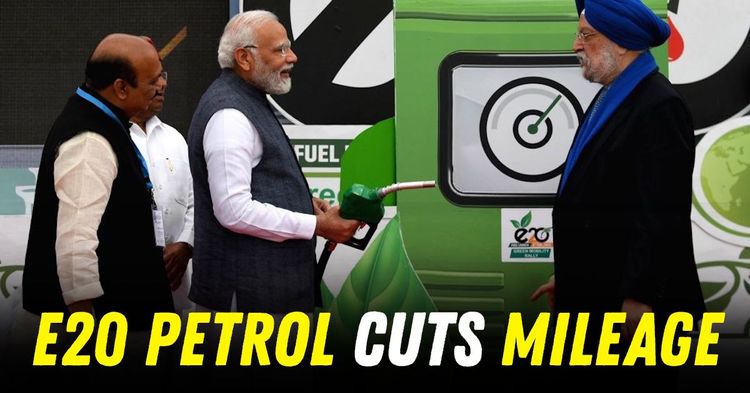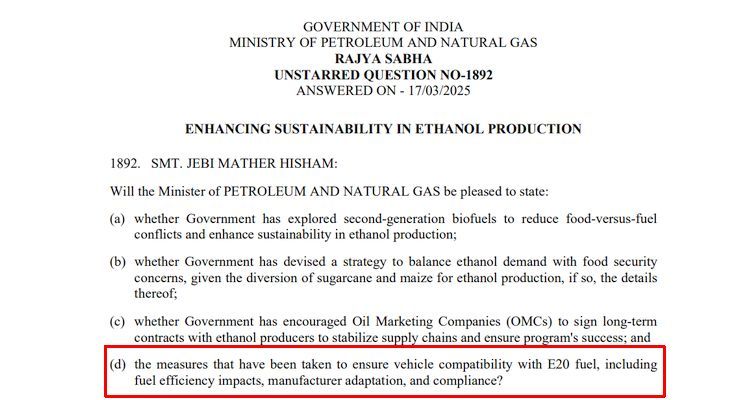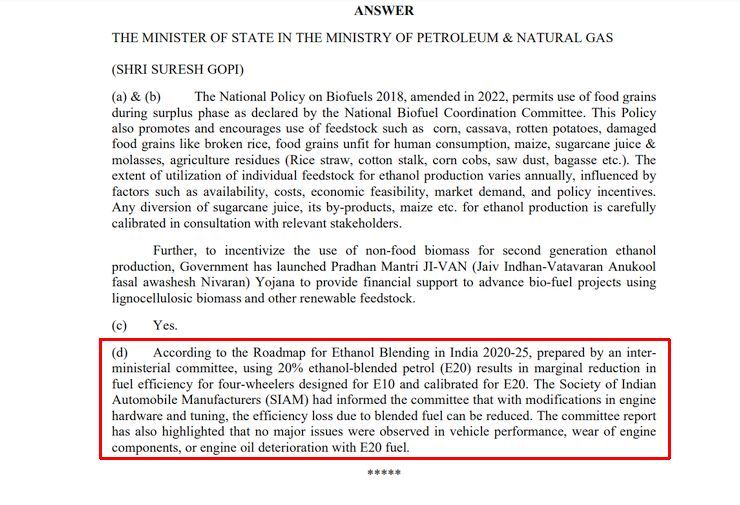E20 Petrol Has Reduced Fuel Efficiency of Your Car: Govt Admits


Union Minister Nitin Gadkari is one of the key figures promoting alternative fuel options along with EVs. He has been a strong advocate of ethanol, pushing hard for its adoption and even compelling vehicle manufacturers in India to develop flex engines or engines compatible with this fuel. Ethanol is produced from plants and is said to reduce pollution compared to regular petrol and diesel. However, if you are under the impression that ethanol-blended fuel will improve fuel efficiency, you might be mistaken—the government itself has admitted otherwise.

Shri Suresh Gopi, Union Minister of State for Petroleum and Natural Gas, answered an unstarred question asked by Jebi Mather Hisham in the Rajya Sabha. One of the questions pertained to the measures taken to ensure vehicle compatibility with E20 fuel, including its impact on fuel efficiency, manufacturer adaptation, and compliance. To this, Minister Suresh Gopi replied, “According to the Roadmap for Ethanol Blending in India 2020-25, prepared by an inter-ministerial committee, using 20% ethanol-blended petrol (E20) results in a marginal reduction in fuel efficiency for four-wheelers designed for E10 and calibrated for E20.”
The majority of cars currently on Indian roads use engines that are not compatible with blended fuel. Since these engines are not tuned for the change, they do not burn the blended fuel properly, resulting in lower efficiency.
In the same reply, the minister added that The Society of Indian Automobile Manufacturers (SIAM) had informed the committee that with modifications in engine hardware and tuning, the efficiency loss due to blended fuel can be reduced. The committee report also highlighted that no major issues were observed in vehicle performance, wear of engine components, or engine oil deterioration with E20 fuel.

So, while ethanol might be greener, it is not fuel-efficient. This means that as a consumer, you will end up spending more on fuel every month since your car will not deliver the same efficiency as before.
For the uninitiated, ethanol is an alternative biofuel. It is considered one of the most promising renewable and eco-friendly fuels. It is made from by-products of plants such as corn and sugarcane. Ethanol was introduced to the market to reduce dependence on imported fuels. Additionally, its production supports local agriculture and reduces greenhouse gas emissions, making it a greener choice.

Another question in the questionnaire addressed whether the government has explored second-generation biofuels to reduce food-versus-fuel conflicts and enhance sustainability in ethanol production. The Union Minister responded, “The National Policy on Biofuels 2018, amended in 2022, permits the use of food grains during surplus phases as declared by the National Biofuel Coordination Committee.
This policy also promotes and encourages the use of feedstock such as corn, cassava, rotten potatoes, damaged food grains like broken rice, food grains unfit for human consumption, maize, sugarcane juice & molasses, and agricultural residues (rice straw, cotton stalk, corn cobs, sawdust, bagasse, etc.).
The extent of utilization of individual feedstock for ethanol production varies annually, influenced by factors such as availability, costs, economic feasibility, market demand, and policy incentives. Any diversion of sugarcane juice, its by-products, maize, etc., for ethanol production is carefully calibrated in consultation with relevant stakeholders.”